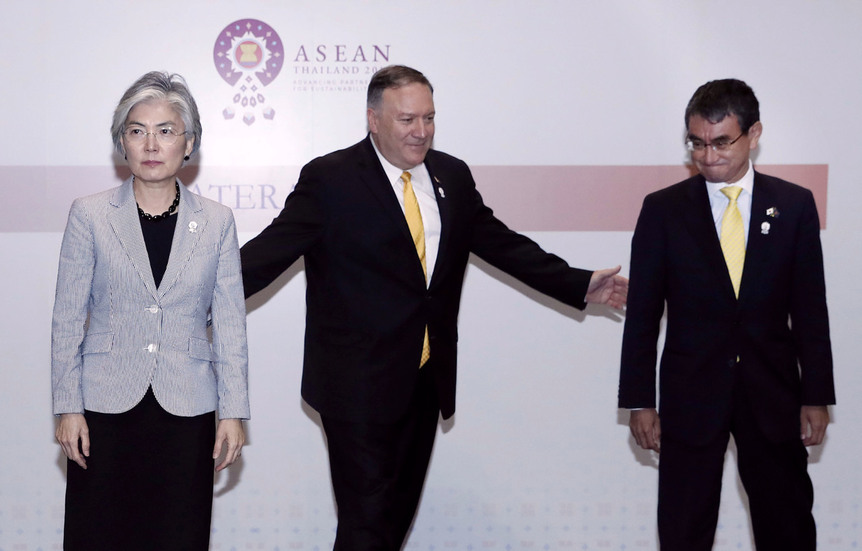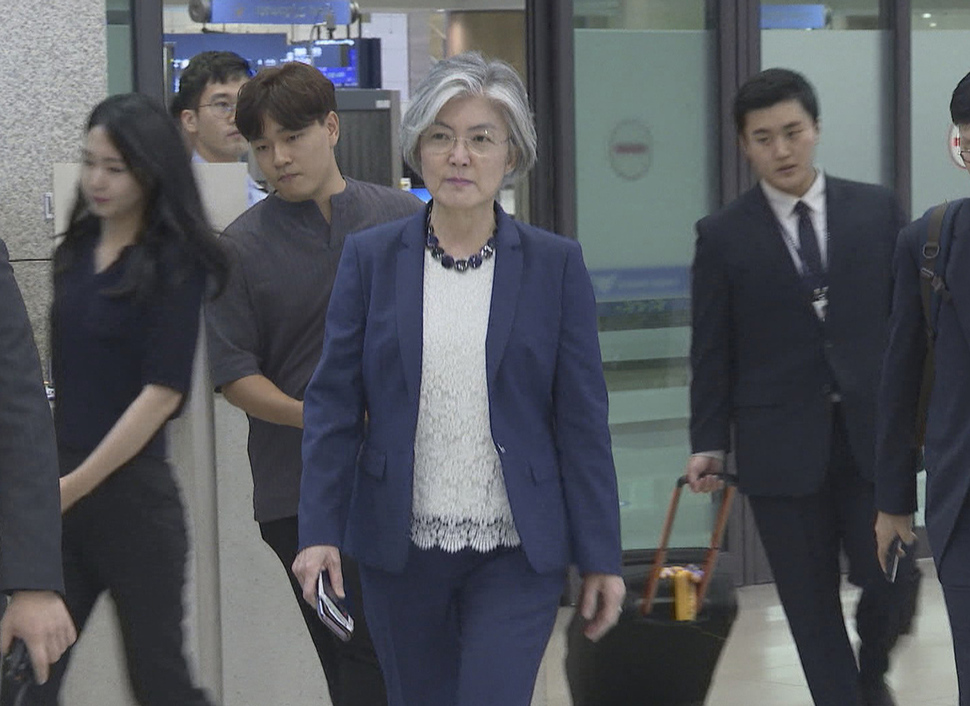 |
|
US Secretary of State Mike Pompeo gestures to South Korean Foreign Minister Kang Kyung-wha and Japanese Foreign Minister Taro Kono. The three diplomats had just taken a commemorative photo, following their meeting at the Centara Grand Hotel in Bangkok on the afternoon of Aug. 2.
|
Indication of international opinion favoring S. Korea in trade dispute with Japan
A chairman’s statement containing the results of an ASEAN-related multilateral meeting in Bangkok on Aug. 1–3 included a message warning about protectionism and stressing the importance of free trade. The inclusion is seen as reflecting the results of an international public relations campaign by the South Korean government, with a focus on spreading the word with the international community regarding Japan’s economic retaliation measures against South Korea. For the first time, the chairman’s statement issued on Aug. 3 from the ASEAN+3 (South Korea, China, and Japan) Foreign Ministers’ Meeting included a reference to “rising trade tensions,” with a passage indicating that the foreign ministers had “cautioned” about the influence of those tensions on growth. The statement also said the ministers had “expressed concern over the rising tide of protectionism and anti-globalization sentiments that continue to plague the global economy and put the multilateral trading system at risk.” The message is being seen as an indirect reference to both the US-China trade conflict and Japan’s adoption of export control measures against South Korea and the removal of South Korea from its “white list.” It was also a much more forceful message than the one included in the chairman’s statement from last year’s meeting in Singapore, in which the participants affirmed their commitment to maintaining a trade system that was “free,” “open,” and “rules-based” to support integration of regional economies. In connection with this, a Ministry of Foreign Affairs senior official said on Aug. 4 that “while the nature of a multilateral meeting is such that it is not really possible to mention specific countries, the expression of concern by multiple countries is being seen as a reflection of their individual interests concerning Japan’s export control measures and the South Korea-Japan conflict.“ “We also believe the global confrontation stemming from US-China trade issues played a part, of course,” the official added. During a four-day visit to Bangkok from July 31 to Aug. 3 to attend the ASEAN Regional Forum (ARF) and ASEAN-related meetings, South Korean Minister of Foreign Affairs Kang Kyung-wha participated in six multilateral meetings and seven bilateral meetings. Notably, she was reported as having made remarks denouncing Japan’s export controls and other economic retaliation measures against South Korea at every one of them – including meetings where Japanese Foreign Minister Taro Kono was also present. On Aug. 2, the day of the decision at a Japanese Cabinet meeting to remove South Korea from the white list of countries receiving expediting export reviews, Kang openly denounced the Japanese government’s actions at a multilateral meeting attended by Kono. The Singaporean and Chinese foreign ministers responded with remarks expressing support, which observers have taken as a sign that South Korea may have effectively gained the upper hand in the international opinion campaign.
 |
|
South Korean Foreign Minister Kang Kyung-wha arrives at Incheon International Airport on Aug. 3 after attending the ASEAN Regional Forum (ARF) in Bangkok. (Yonhap News)
|







